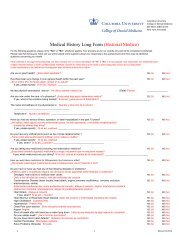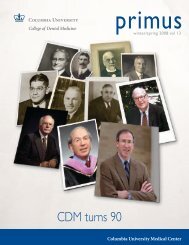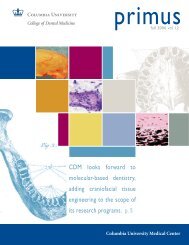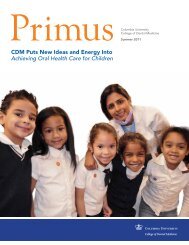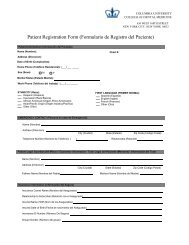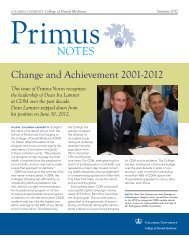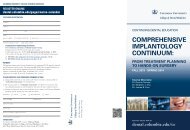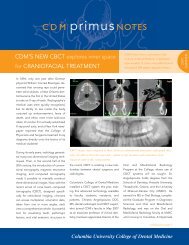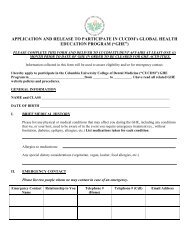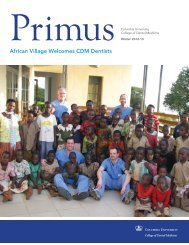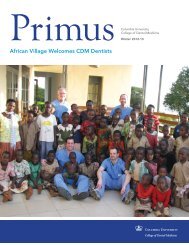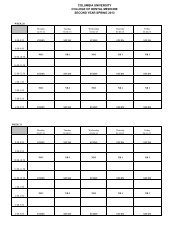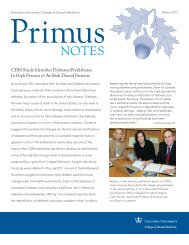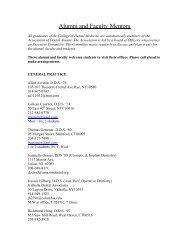Jarvie Journal - College of Dental Medicine - Columbia University
Jarvie Journal - College of Dental Medicine - Columbia University
Jarvie Journal - College of Dental Medicine - Columbia University
Create successful ePaper yourself
Turn your PDF publications into a flip-book with our unique Google optimized e-Paper software.
Volume 56, Spring 2013<br />
The Efficacy <strong>of</strong> a Web-based Course on Tobacco Cessation for <strong>Dental</strong> Residents<br />
Debra Mandelbaum 1, David A. Albert 1 *, Sharifa Z. Barracks 1 , Emilie Bruzelius 1 , Angela Ward 1 , Cindy Smalletz 2 , Noreen<br />
Myers-Wright 1<br />
1 <strong>College</strong> <strong>of</strong> <strong>Dental</strong> <strong>Medicine</strong>, <strong>Columbia</strong> <strong>University</strong>, NY, NY<br />
2 <strong>Columbia</strong> Center for New Media Teaching and Learning, <strong>Columbia</strong> <strong>University</strong>, New York, NY, *Faculty Mentor<br />
Introduction: Tobacco use is the number one cause <strong>of</strong> preventable disease and death in the United States. Each year, more than<br />
400,000 people die in the U.S. from smoking related causes. Research shows that when clinicians advise their patients to quit<br />
they are 30% more likely to be smoke free one year later. As frequent screeners <strong>of</strong> the population at large, dentists can serve as<br />
key players in the cessation process. In addition to the life threatening effects <strong>of</strong> tobacco use, dentists are able to understand the<br />
importance <strong>of</strong> tobacco's impact on the oral cavity, and can share this information with patients to help them quit. Tobacco use is<br />
associated with periodontal disease, subsequent bone loss, pathology, and deterioration <strong>of</strong> restorative work. Smoking cessation<br />
counseling at every visit and preceding any definitive treatment can help prevent these adverse effects. Despite this, there has<br />
been limited adoption <strong>of</strong> tobacco cessation counseling in practice by dentists. By participating in a self-paced online tobacco<br />
cessation course, dental residents can increase their awareness, knowledge, and confidence at the residency stage <strong>of</strong> training to<br />
help increase the implementation <strong>of</strong> tobacco cessation in practice.<br />
Objective: The objective <strong>of</strong> this study was to assess the efficacy <strong>of</strong> an educational website developed for Jacobi Medical Center<br />
<strong>Dental</strong> Residents and <strong>Columbia</strong> <strong>University</strong> <strong>College</strong> <strong>of</strong> <strong>Dental</strong> <strong>Medicine</strong> postdoctoral students on tobacco cessation counseling.<br />
We specifically looked at the ability <strong>of</strong> the multimedia tool to influence the attitudes and behaviors <strong>of</strong> the residents and to<br />
increase their knowledge <strong>of</strong> the pharmacotherapies and behavioral interventions developed for assisting patients quit<br />
successfully.<br />
Materials and Methods: A web-based, self-paced, interactive module on tobacco cessation was developed for the residents. The<br />
course consisted <strong>of</strong> 3 sections: Pre-exam, Post-exam, and Helping Patients Quit. The educational content consisted <strong>of</strong> a printable<br />
course guide, pharmacotherapy table, online texts and videos, brief interactive knowledge and skills assessments, and a virtual<br />
patient exercise. We collected pre- and post-survey data that captured demographic information, evaluated if there was an<br />
increase in the residents' knowledge and awareness <strong>of</strong> tobacco use cessation counseling practices, and compared the residents’<br />
self-efficacy in and attitudes toward tobacco use cessation counseling. Subjects were recruited in email and in person, and<br />
participation in the study was completely voluntary. All analyses were conducted using SPSS (version 17.0).<br />
Results and Conclusions: There were 59 residents from <strong>Columbia</strong> <strong>University</strong>/New York Presbyterian Hospital and 17 from<br />
Jacobi Medical Center in our study. At baseline, 62 (81%) <strong>of</strong> the residents believed that dentists are responsible for Tobacco<br />
Cessation counseling. Although residents believed that they should be responsible for tobacco cessation they rated their<br />
confidence in conducting these activities as low. Out <strong>of</strong> a possible score <strong>of</strong> 35, the mean score for tobacco cessation counseling<br />
was 18.5 and the mean for prescribing pharmacotherapeutics was 14.6. Paired sample t-tests showed a statistically significant<br />
increase from pre-survey to post-survey in self-efficacy in prescribing (14.58 vs. 21.30), counseling (18.47 vs. 23.4), and total<br />
self-efficacy (32.98 vs. 44.67) scores. There were no differences in these scores by gender, race/ethnicity, school, or specialty.<br />
Regarding changes in knowledge, there was a statistically significant increase in total knowledge scores from the pre-survey<br />
(M=2.017) to the post-survey (M=2.559), p



